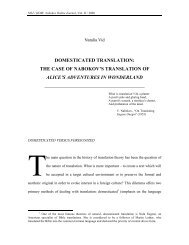Nabokov's Invitation to Plato's Beheading
Nabokov's Invitation to Plato's Beheading
Nabokov's Invitation to Plato's Beheading
- TAGS
- beheading
- etc.dal.ca
Create successful ePaper yourself
Turn your PDF publications into a flip-book with our unique Google optimized e-Paper software.
NOJ / НОЖ: Nabokov Online Journal, Vol. I / 2007<br />
It may well be, however, that Socrates’ doubts about afterlife reflect our own<br />
uncertainties about ways of reading Phaedo. Pla<strong>to</strong> seems <strong>to</strong> have succeeded in creating a<br />
sense of indeterminacy about Socrates’ prospects of surviving his death, which translated<br />
in<strong>to</strong> the work’s interpretive possibilities. Even a brief survey of Pla<strong>to</strong>’s scholarship would<br />
show how diverse interpretations of Pla<strong>to</strong>’s theory of afterlife can be.<br />
How did Nabokov read Phaedo? Did he recognize its literary complexity, or did<br />
he read it as a pseudo-literary philosophical work in which the death of Socrates is<br />
nothing more than an occasion <strong>to</strong> express Pla<strong>to</strong>’s seemingly simple notion of<br />
immortality? The answer <strong>to</strong> this question would help us understand whether <strong>Invitation</strong> <strong>to</strong><br />
a <strong>Beheading</strong> was a parody of what he thought was the simplicity of Pla<strong>to</strong>’s Phaedo, or an<br />
unintentional tribute <strong>to</strong> its complexity.<br />
It appears that Nabokov made the readers of his novel as conflicted about ways of<br />
reading his work as Pla<strong>to</strong> made his. It is a strange coincidence (if it is a coincidence) that<br />
the readers of the <strong>Invitation</strong> <strong>to</strong> a <strong>Beheading</strong> seem <strong>to</strong> follow the same interpretive paths as<br />
the readers of Phaedo. The novel can easily be read as a sterile allegory of artistic<br />
creation, in which an artist transcends the limits of his existence with his imagination. In<br />
an alternative reading, however, we encounter a doomed man in doubt about the<br />
existence of the afterlife which remains nothing more than a comforting illusion. It is<br />
doubtful, I think, that Nabokov would make his novel prone <strong>to</strong> a reductive interpretation<br />
according <strong>to</strong> which Cincinnatus’ hopes and imaginative powers are simply rewarded at<br />
the end. The mysterious indeterminacy of death is a recognizable trait of Nabokov’s way<br />
of writing about it, the subject which Nabokov forces us <strong>to</strong> examine without any promise<br />
of certainty. This is what we encounter not only in <strong>Invitation</strong> <strong>to</strong> a <strong>Beheading</strong> but many of
















